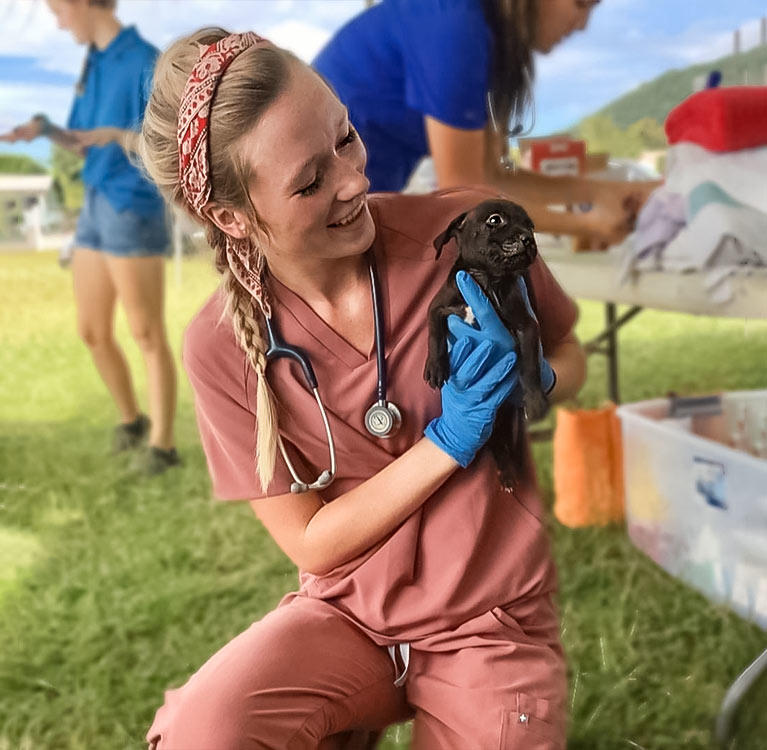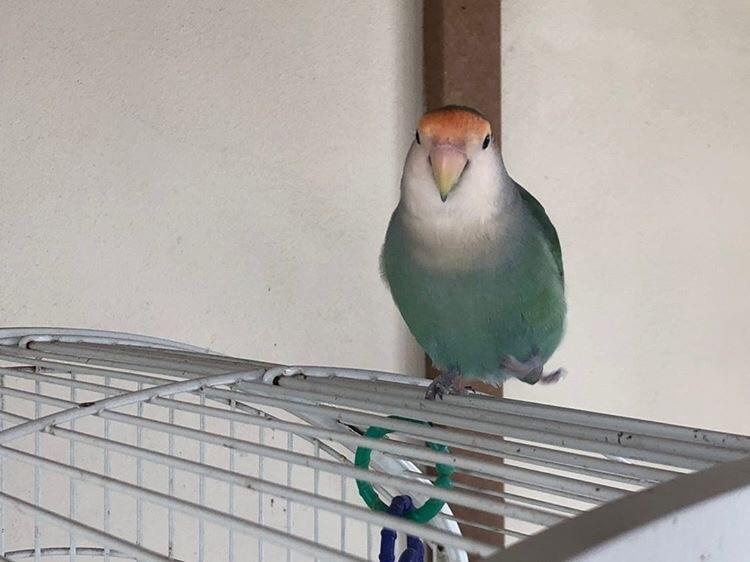A dachshund is admitted to a University Hospital. He has a huge wound in his neck, where he has been gored by a wild boar. Barely responsive, resuscitation efforts only cause the wound to start bleeding again. Enter a senior surgeon who promptly sutures his jugular. In about 48 hours the dog is alive and on the mend.
For future students of veterinary medicine, witnessing events like this can inspire a career working with animals. The dachshund story was recounted by a member of the Ross Vet faculty who shared this: “A single trait, the love of animals, can open the doors to a wealth of careers”. Here’s a look at some of them.
Top Careers working with animals
What are the specialties associated with a career in animal care? There are many — not so different from human medicine. You could be a family practitioner, a cardiologist, ophthalmologist, dermatologist or surgeon. You could work in private practice or a university as an academic instructor and researcher.
The big difference between being a practitioner of human medicine and a person working with animals is that, instead of a single species, you’re treating many — everything from livestock (farm animals) to pets (cats and dogs) to exotics such as rabbits, rats, guinea pigs, turtles, and birds. And then there are zoo animals where the variety is even greater: lions, tigers, and bears, dolphins, and seals, tiny songbirds or rare species of frogs — you name it. Each features a unique physiology, and each is susceptible to different varieties of diseases.
Add to that the differences in behavior. According to Dr. Mike Adkesson, VP Clinical Medicine, Chicago Zoological Society, Brookfield Zoo, “Animals obviously can’t talk. So, arriving at a diagnosis can be more challenging. Treatments can also be more challenging: animals do not understand the need to take a particular medicine or behave in a certain way. It is much easier to convince a person to rest following surgery than it is to convince a dog to do the same.”
“All veterinarians,” adds Adkesson, “must have some understanding of animal behavior to help them avoid stress and pain. People working with animals must understand common behavioral problems in the clinical signs that may manifest as a result of these. A general knowledge of appropriate behavioral training and modification is necessary to help pet owners deal with common concerns. There is even a veterinary specialty that focuses on animal behavior.”
Veterinarians can also find careers working with large food producers, ensuring that the human food supply is safe. Plus, veterinary research is essential to developing vaccines and diagnostic tools. So, many of our colleagues work for large pharmaceutical companies that address both animal and human diseases. And let’s not forget the military. Dogs are not only trained to protect soldiers in war zones but serve as essential companions to those who suffer from PTSD.
With so many options, how do you choose among them? Dr. Juliette Bouillon, a professor at Ross Vet has this to say:
“Before making the decision to choose a career path, it is critical to think of all the facets of the job. Be prepared to be wrong. Whether it’s prior, during, or after vet studies, being wrong should not be perceived as a failure. Learning happens with trials, and we all learn from mistakes. This journey leads to new perspectives. Having a successful veterinary career is not just about the specialty you choose but being true to professional ethics and your well-being.”
The small animal veterinary practice
“In the morning you may have 3 surgeries on your schedule: two neuters and an eyelid mass removal. In the afternoon, there are appointments; a dog with diarrhea, a cat with itchy paws, and the normal wellness vaccines.”
So says Dr. Amanda Samson, DVM and Medical Director for Chicago area Boone Animal Hospital. She shared a recent emergency case involving a puppy who came in close to death.
“The owner brought in a 6-month old Labrador puppy. It was laterally recumbent (unable to stand) and minimally responsive. This was a critical case. The owner couldn’t tell us what happened; she came home after working at night and found the dog in this condition.
“We started fluids immediately to stabilize. Then took X-rays which revealed an overly-full stomach — even for a hungry young puppy. Surgery uncovered something astounding. The dog had eaten an entire toddler zip-up hoodie…swallowed it whole! Upon removal, post-op recovery was the fastest I’ve ever seen. The puppy was back to normal that same night, looking for more ways to get into trouble. This is what makes my job so gratifying.”
In the area of private practice, what does someone who works with animals need to know? Of course, a person who works with animals should love them, but your ability to communicate with people is critical as well. Small animal veterinarians must be good listeners. They must probe the owner for information that will help identify the problem. Empathy is also important because end-of-life issues arise regularly, and you must be able to talk people through it. The key ethical goal is doing what’s right for the pet and avoiding unnecessary suffering.
Zoology — caring for exotic animals
Veterinarians who choose zoological medicine do a lot of the daily care and wellness check-ups as small animal vets, but, in the words of Dr. Mike Adkesson, “there is no normal day-in-the-life of a zoo veterinarian.” He adds, “A day can involve work on anything from a tiger or dolphin in the morning to a flock of 50 birds in the afternoon.”
Brookfield Zoo is a well-known and respected zoo in the U.S., and animal conservation is one of their core competencies. Adkesson tells the story of a black rhinoceros named Layla who had a mass that was restricting her airflow.
Says Adkesson, “Even simple diagnostic and treatment procedures in a rhinoceros are very challenging given their size. A single anesthetic event generally takes a team of at least 7 veterinarians and veterinary technicians, plus 15 animal care staff to assist with moving the animal once anesthetized. To provide treatment for Layla, our team worked with a variety of veterinary specialists including surgeons, dentists, anesthesiologists, and radiation oncologists. We have pushed the boundaries of what was considered possible in a rhino by performing a CT scan of her skull to aid in diagnosing her condition and to plan for surgical intervention. Today Layla continues to do well and is recovering from a problem that she otherwise would not have been able to survive. Rhinoceroses like her are endangered in the wild, so every individual animal plays a crucial role in the conservation of this amazing species. “
Dr. Adkesson was drawn to veterinary medicine after being involved in a youth volunteer program at the age of 10. “For me, it just clicked, and from that moment forward, I was focused on a career working with zoo animals.” However, he cautions, “It’s not the right career for every animal lover. We are faced with many tough decisions and must invest long hours in education and career development. Veterinarians need good problem-solving skills and the ability to work calmly under pressure. They must be adroit communicators to work within a team and to interact with clients and animal caretakers.”
Teaching others how to work with animals
Ross University School of Veterinary Medicine is led by educators and researchers in the field. One of our faculty members, Dr. Hilary French, comes from a lineage of veterinary practitioners. “My grandfather was a typical vet who practiced mixed animal medicine out of his home for 20 years, before it grew into a 6-person practice in rural Minnesota. My father is an equine veterinarian who worked as an ambulatory vet before he joined the university world. Today he is head the department at the University of Illinois.”
As French says, “Veterinary medicine is one of the most expansive careers available. The training allows students to design careers that best suit their interests and personalities.
Who are veterinarians? They are researchers developing vaccines to protect our health and utilizing animals as a model for investigations safely and humanely. They are educators developing virtual programs that allow students to understand anatomy and pathophysiology. They are wildlife experts working to keep endangered species from becoming extinct.”
Dr. French is currently engaged in research with feral donkeys, developing a contraceptive program intended to control the population throughout the Caribbean.
Juliette Bouillon, also a professor at Ross Vet, speaks of how research and teaching form an integral whole and offer an exciting path for those inclined.
“As a teacher,” says Bouillon, “I do rounds with DVM students, interns, and residents where you review and discuss hospitalized pets and then supervise these learners for the consultations of the day. Usually, a student is paired up with an intern or a resident who will also guide them through the case management. This way, students can safely develop their clinical skills.”
The research Bouillon is currently involved in works to sharpen the clinical and diagnostic skills of her students. “Right now,” she says, I am engaged in two research projects. One involves the Parvovirus (gastroenteritis) in dogs. The other studies an infectious disease called Ehrlichiosis that can be asymptomatic in many animals but that can cause abnormal bleeding, fever, and lethargy in dogs and cattle. In fact, it can kill them.” She is studying a new strain that is appearing in local farmed cattle.
Careers Working with animals — is there one for you?
The veterinarians who contributed to this story had some common pieces of advice.
- There are endless career opportunities available to veterinarians. You can go into private practice caring for pets or livestock. You can choose a specialty such as cardiology, ophthalmology, dermatology, surgery, oncology, or emergency medicine. You may choose to work in zoological medicine or find a career in public health, food safety, epidemiology, and disease prevention. Finally, you may be drawn to teach which also involves research, scientific discovery, and publication.
- Know the field. Shadowing in veterinary clinics or volunteering in animal shelters are good options to gain insight into whether you want to pursue the profession. If it’s a toss-up between aspiring to be a veterinarian or an accountant, you’ll probably do better to choose the latter. The DVM degree is three to four years. A specialty degree can be from 1 to 3 additional years, and the working professional often puts in long hours on both the clinical side and the teaching side. Plus, the financial cost to reach your goal can be steep.
- Don’t forget, the rewards are great. No matter which direction your education takes you, veterinary medicine is a gratifying field. DVMs help the animals in our care, the people who own them, and we can contribute to the health and well-being of our environment.
Interested in earning your DVM? Learn more.








